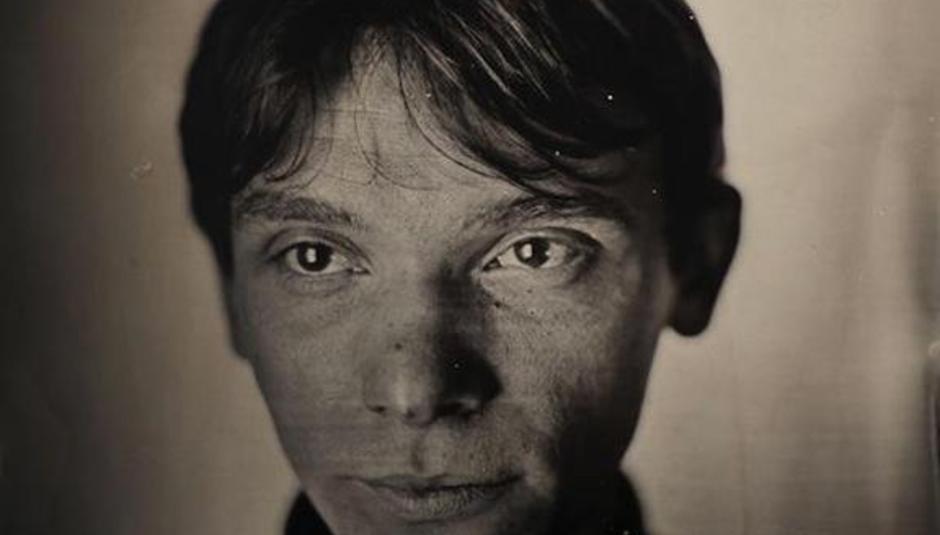“I’m trying to be a better vegetarian,” says David Brewis, as to why he won’t be visiting Sunderland’s first sushi restaurant when it opens in a few weeks. “I’m a vegetarian,” a passing teenager butts in. “Do you eat fish?” Brewis asks. She doesn’t. “Well, there you go,” he concludes as we head on up the street.
We run into our new acquaintance again round the corner. “There’s my new vegetarian friend!” she shouts to her mate, before racing past us making loud chicken noises. Soon she’s following us up the road, yelling and giggling, doing little to challenge the Daily Mail’s perception of how young people behave in the north-east. “I don’t think she’s really vegetarian,” David admits. He doesn’t come into Sunderland city centre much.
Yet of course he’s synonymous with it – Sunderland generally, at least, if not the high street specifically. As Field Music, David Brewis and his brother Peter, along with the Futureheads and a handful of others, are what many music fans think of when Wearside is mentioned. The city has an approach to sound – an arty unpretentiousness, an unassuming ambitiousness – which has lingered since long before ‘Decent Days And Nights’ was bothering the charts, and is reimagined once again in Old Fears, David's second album as School of Language.
“I guess I had it in the back of my mind that it was good to have a name for stuff that was just me, rather than stuff me and Peter did together,” explains David on the origins of his solo alter-ego. “Certainly when I made the first School Of Language album I didn’t know whether there’d be another Field Music album so I wasn’t thinking of it as a side-project, or I wasn’t even thinking about balancing between the two at the time. But it made sense now to go back to it.”
David first assumed the School Of Language identity during Field Music’s hiatus in 2008, releasing an album, Sea From Shore, while his brother made music as The Week That Was. Listening back now, both records mark a turning point in the Brewis sound, building on the low-key art-rock formula they’d shaped on 2007’s Tones Of Town to create a more jagged version of the prog-pop that won them widspread acclaim when they returned to release Field Music (Measure) in 2010.
The first ideas for the altogether more relaxing Old Fears formed as Field Music toured their Mercury Prize-nominated fourth album, Plumb, in 2012. After the band played its last gig for the forseeable at Newcastle’s Cluny that November, Peter began “paternity leave” the following March, giving David the chance to start working properly on Sea From Shore’s successor. In theory:
“It was just a question of when I would find time to work at it in a more systematic manner than a snatched afternoon here or there. But I was so busy last year that rather than being a snatched afternoon it was more like a snatched two week slot. But that kind of suited it as well.”
After only finding a couple of weeks in March to work on Old Fears, and a couple more in July, the record wasn’t actually completed until the last two months of 2013, as other projects kept creeping in: recording sessions with pals in Maxïmo Park, Hyde And Beast, Rivals, and Pea Sea; a film score with Peter for the Berwick Film and Media Arts Festival; composing music for a group of poets to use in a radio programme about Newcastle; and two short stints in Eleanor Friedberger’s live band.
Despite these distractions, Old Fears is a remarkably cohesive piece of work, and far more rounded than its lovably jutting and jerking predecessor. In a similar way to Plumb, it glides rather than twitches, from the gloopy synth of ‘Distance Between’, through the claustrophobic Kraftwerkisms of ‘Between The Suburbs’, to the glassy gloom of ‘You Kept Yourself’.
“I had in mind that I wanted to do a record that was all of a piece,” David explains, “so the first couple of bits of music implied what that should be, and it made much more sense to do it as a whole than it would have for me and Peter to try and find a middle ground. But also, we did Measure and Plumb in pretty quick succession and when we’re doing that, going from recording to rehearsing to touring, we do everything together. We’re together an incredible amount of time and we get on great but it’s good to have something that we don’t do together.”
It goes without saying that there’s a freedom that comes with flying solo that you don’t get when working in collaboration with another songwriter, blood relative or not. “It feels very free not to be embarrassed about what you’re going to play to somebody,” David says, “and maybe that allows you to try some things that don’t work and then it doesn’t matter, because you can pretend it never happened. Or you can do some things which are going to sound wrong until they’re finished and you can try some things that are more lyrically personal.”
“For me,” he adds, “I haven’t had to go through that embarrassment until we started rehearsing the songs with the band, and then most of the people in the band know what I’m talking about in the songs and might laugh about it a bit.”
As hinted at in the album title, the subject matter on Old Fears actually dates back a few years, to the early noughties. Whether it’s about David meeting his wife (‘Suits Us Better’) or failed birthday plans (‘A Smile Cracks’), the stories told here are far more intimate than the broader observational brushstrokes that make up the lyrical landscape of Field Music.
“Much of the record is about the period when I was finishing university,” David explains, “where I was at my most anti-social and most struggling with the outside world, and being the kind of person who masked that shyness with appalling teenage arrogance. For me, that seems like too much to lay on Peter’s door as well.” So why go back to it all now?
“I wanted to kind of dig at things that were most important to me and when I started to look at my motivations for doing things, the things which were on my mind most, there’s this long list of anxieties, and then this short list of things that I really loved, and the record’s a bit like that.
“When I look at those anxieties quite a few of those were at their apex at this 19, 20, 21 age. Not all of them, but that just seemed like a pivotal time for me turning into who I am now. And I’ve got just enough distance to look back on it and laugh, and not be too embarrassed about it to talk about it. It’s on the cusp.”
There is, of course, a lot that’s changed for David Brewis since those awkward days of early adulthood – and quite a bit that’s stayed the same too. He’s seen his mates from the Sunderland music scene go on to do things like release top ten singles and edit a major music magazine; and he’s seen his own band grow from touring their first album in their dad’s Mondeo estate to become Mercury Prize nominees. In 2012, he even became a (somewhat reluctant) spokesman for the Sunderland music community, when he was provoked into writing a deeply inspiring synopsis of what it was that made the city’s scene work for The Guardian.
And it’s that which hasn’t changed: the bonds that helped a handful of Mackems get their big break in the mid-noughties are as strong as ever. As David explains: “Most of the people who have done records in Sunderland and got out a bit further are all of a similar age, we were all involved in those gigs that were happening at the same time in ’98 to 2003, and all of us are still friends and we support each other with the things we’re doing, whether that’s [Frankie and the Heartstrings’ record shop] Pop Recs or getting [Futureheads bassist] Jaff to come and play in the [School Of Language live] band. ‘Jaff, just come and play in the band. Why not? Why not? What else are you gonna be doing? Dissertation? Ah, forget that.’
“But maybe that’s made it harder for younger bands. I mean, they think we’re this elitist clique and I don’t see it that way because we’re just mates. What do you want us to do?”
Fair question: it’s not like the Brewises have been in active pursuit of fame and fortune, after all (“I don’t want to play 1,200 capacity venues… 500 capacity venues forever – that would be fine for me”). Any success they’ve had, it seems, has been entirely accidental, and any status they’ve attained as local music ambassadors has been thrust upon them. David admits, “Me and Peter, in supporting local bands, are less engaged because we’ve always had this drive to be self-contained. But you know the Futureheads, they set up Split Festival, and they’ve always made sure there’s strong local representation. Or the Heartstrings setting up the shop – if you’re a young local band and you wanna do a gig at the shop, you go and say, ‘Can we do a gig in the shop?’ and that’s basically it and it’s done.”
But you can’t please everyone, as David notes with a mix of frustration and typical good humour: “I suppose there’s an aspect in Sunderland where maybe it’s a young band, just doing the same gigs playing to the same people and maybe they aren’t all that great? Or maybe aren’t all that interesting? ‘Well, it’s because we’re not getting any help from those dickheads in the Futureheads and Field Music, making their flippin’ barbershop post-punk tribute music. It’s not real rock ‘n’ roll at all. They’re bloody vegetarians, look at them.’ That kind of criticism is relatively daily basis kind of stuff.”
The reality though, is that while David Brewis might be one of the best known names in the Sunderland music scene, it’s as a member of a band that surprised fans when they revealed that they only earn five grand a year; a band whose Mercury Prize shortlisted album has still sold fewer copies than its predecessor; a band who talk of returning to normal day jobs not in terms of if, but when.
David admits he could probably make a living from turning the Field Music recording space into a commercial studio, but says he lacks the patience for it: “I wouldn't be able to be as choosy as I am now. Right now I only let people come in the studio when it’s people I like, people I know can play and have good ideas.”
Even plans to promote Old Fears don’t go further than the seven School Of Language gigs already in the diary. That’s partly due to the fact that David will be starting his own paternity leave in June, but there’s also a sense that’s he’s happiest at home in Sunderland, working on the next project (as well as recording music to accompany Maxïmo Park frontman Paul Smith’s travel writings, David’s talking about working on a piece of theatre in the near future).
What’s clear is that no matter what he’s doing, David Brewis will be keeping a low profile as far as he can: “I don’t like it when people who aren't that interested in music, my neighbours or whatever, ask us, ‘What kind of thing do you do?’
“‘It’s just kind of a weird pop music that not many people want to listen to.’ That seems to satisfy them enough to stop asking.”
Old Fears is released this week on Memphis Industries.
School Of Language have the following shows booked:
April 7th – Newcastle, The Cluny
April 10th – Paris, Point Ephemere
April 22th – Bristol, Exchange
April 23th – London, The Lexington
April 25th – Glasgow, Broadcast
April 26th – Leeds, Brudenell Social Club
April 28th – Manchester, Deaf Institute






















